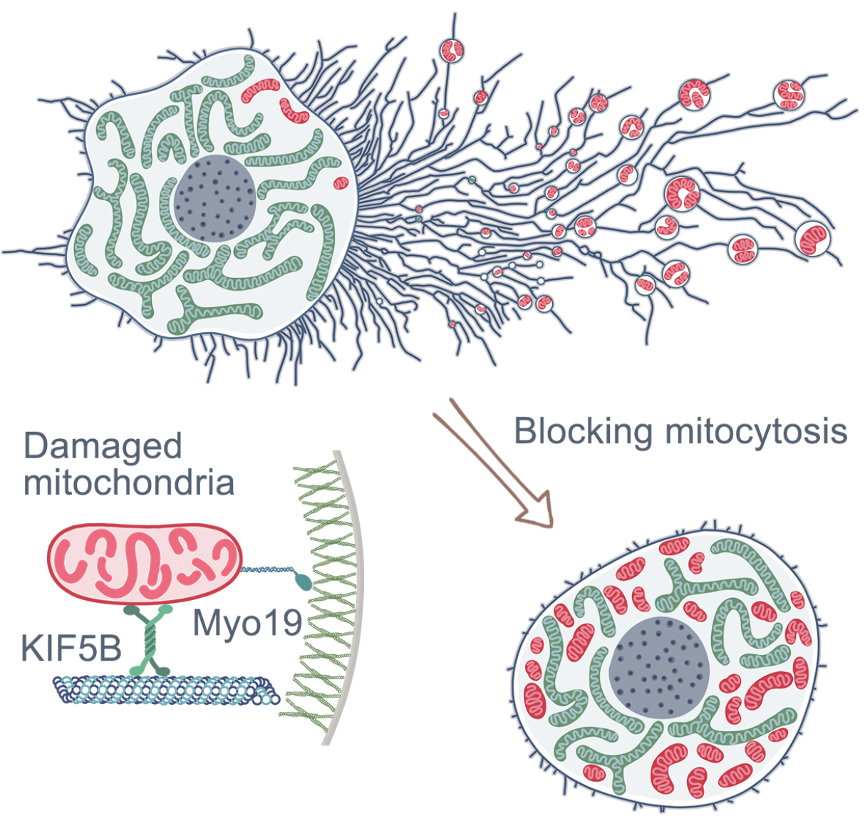As vital organelles for eukaryotic cells, mitochondria are subject to tight quality control. Various mechanisms, including mitochondrial proteases, proteasome-mediated degradation of outer mitochondrial membrane (OMM) proteins, degradation of mitochondrial-derived vesicles (MDVs), and mitophagy have been shown play important roles in mitochondrial quality control.
On 27th May of 2021, Professor Li Yu’s laboratory from School of Life Sciences of Tsinghua University published a research article on Cell, titled “Mitocytosis, a migrasome mediated mitochondrial quality control process”. The article reported a novel mitochondrial quality control process——Mitocytosis, which helps to mediate intracellular mitochondrial homeostasis. This research is also the first time to reveal the autonomic cellular function of migrasome.
In this study, we report mitocytosis, a migrasome-mediated mitochondrial quality-control process. We found that, upon exposure to mild mitochondrial stresses, damaged mitochondria are transported into migrasomes and subsequently disposed of from migrating cells. Mechanistically, mitocytosis requires positioning of damaged mitochondria at the cell periphery, which occurs because damaged mitochondria avoid binding to inward motor proteins. Functionally, mitocytosis plays an important role in maintaining mitochondrial quality. Enhanced mitocytosis protects cells from mitochondrial stressor-induced loss of mitochondrial membrane potential (MMP) and mitochondrial respiration; conversely, blocking mitocytosis causes loss of MMP and mitochondrial respiration under normal conditions. Physiologically, we demonstrate that mitocytosis is required for maintaining MMP and viability in neutrophils in vivo. We propose that mitocytosis is an important mitochondrial quality-control process in migrating cells, which couples mitochondrial homeostasis with cell migration.
Professor Li Yu’s laboratory from School of Life Sciences of Tsinghua University is the correspondence author of the article. Ph.D. Haifeng Jiao (enrolled in 2016) and post-doc Dong Jiang are the co-first authors of the article. Other members having important contributions to the article are listed below: Xiaoyu Hu, Wanqing Du, Takami Sho, Xuan Wang, Ying Li, Jing Zhang and Zai Chang from School of Life Sciences of Tsinghua University, and Professor Xiaoyu Hu from School of Medicine of Tsinghua University and Liangliang Ji, Yuzhuo Yang from her lab, Ph.D. student Bing Peng, Chunhui Wang and post-doc Jianli Weng from Peking University.
Professor Li Yu is now studying in cell biology at School of Life Sciences, Tsinghua University. The laboratory has been engaged in the field of autophagy since its establishment. Recently, Yu’s Lab has discovered a new organelle named migrasome, and is currently conducting in-depth studies on its molecular mechanism and physiological functions. The research in the field of autophagy was selected as one of China’s Top 10 Scientific Advances in 2012. Professor Yu won the Tan Jiazhen Life Science Innovation Award in 2013 and CSCB Outstanding Accomplishment Award in 2021.
This research was supported by the National Natural Science Foundation of China (grant no. 92054301, 31790401, and 32030023), Beijing Municipal Science & Technology Commission (grant no. Z201100005320019), the Ministry of Science and Technology of the People’s Republic of China (grant no. 2017YFA0503404 and 2016YFA0500202).

Migrating cells selectively remove damaged mitochondria to maintain homeostasis in a process called mitocytosis.
paper link: https://doi.org/10.1016/j.cell.2021.04.027
